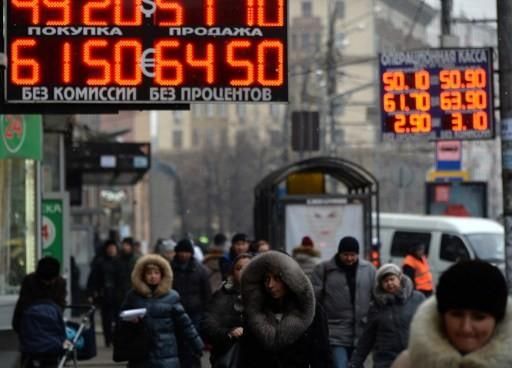文/新浪財經意見領袖(微信公眾號kopleader)機構專欄 查塔姆智庫 作者 理查德-康納利(Richard Connolly,英國皇家國際事務研究所俄羅斯與歐亞項目副研究員)
不少人認為,龐大的外債與不斷萎縮的國際儲備預示著俄羅斯必將發生一場金融危機。但深入分析之后發現,俄羅斯的外債問題被嚴重夸大,出現類似1998年金融危機的可能性幾乎不存在。相比之下,俄羅斯外國直接投資的不斷下滑更為令人擔憂。
 俄羅斯為何不會發生金融危機?
俄羅斯為何不會發生金融危機?盡管俄羅斯經濟形勢依然很嚴峻,但關于俄羅斯外債的問題一直被夸大。
Though the country still faces difficult economicconditions, the problem of external debt has been exaggerated。
由于大量外債面臨到期償還,人們猜測俄羅斯可能會在不遠的將來經歷一場金融危機。然而對于俄羅斯的政策制定者而言,這些金融問題并沒有表面上看起來那么令人擔憂。俄羅斯的外債很大一部分并非由西方銀行持有,而是注冊在國外的其他俄羅斯母公司或控股公司。這種“集團內部”債務很容易重新協定,意味著俄羅斯不可能發生貨幣危機。相反,其他一些指標,比如外國直接投資(FDI),對經濟健康度所發出的信號反而更應注意。
A large volume of scheduled external debt repaymentshas led to speculation that Russia could experience a financial crisis in thenear future. However, these financial vulnerabilities are not as worrying toRussian policy-makers as they might appear. A significant share of Russia’sexternal debt is owed not to Western banks, but instead to other Russian parentor holding companies registered abroad. This ‘intra-group’ debt is easilyrescheduled, which means that Russia is unlikely to suffer a currency crisis –though other indicators, such as foreign direct investment, are more worryingfor the health of the economy。
外儲下降的背后
The dynamics behind falling reserves
去年冬季盧布瘋狂貶值,伴隨俄羅斯外儲下降,生動地展現了俄羅斯經濟的疲軟以及油價下跌對其沖擊之大。
The dramatic depreciation of the roubleover the winter, along with a decline in Russia’s international reserves,vividly illustrated Russia’s economic weaknesses and vulnerability to decliningoil prices。
然而,去年四季度盧布崩潰有一個主要原因與油價下跌并無直接關聯。那就是外債償還額的激增給盧布帶來下行壓力。由于西方國家對俄羅斯實施金融制裁,大量俄羅斯企業進入西方資本市場的通道基本被堵死,而不僅僅是制裁名單上的那些企業。
However, one of the principal causes of therouble’s poor performance in the final quarter of 2014 was not directly relatedto the falling price of oil. Instead, a spike in external debt repayments alsocreated downward pressure on the rouble. Because of financial sanctions imposedby Western states, access to Western capital markets was effectively closed toa large number of Russian corporations, and not just those directly targeted bysanctions。
由于無法為現有債務獲得再融資,俄羅斯企業被迫按期償還債務。其結果是,俄羅斯的總外債從2014年1月份大約7280億美元降至2014年底的5970億美元。外債存量銳減超過1300億美元,包括償債(主要是向西方銀行)以及以盧布計價債務的美元價值的縮減。
Unable to refinance existing debt, Russianfirms were forced to repay their debts on schedule. As a result, Russia’s totalexternal debt fell from around $728 billion in January 2014 to $597 billion atthe end of 2014. This sharp reduction of over $130 billion in the stock ofexternal debt was due to a combination of repayments (primarily to Westernbanks) and a reduction in the dollar value of rouble-denominated debt。
2014年底私人資本加速流出曾引起一陣轟動,據估算2014年總流出達到1540億美元,上述被迫償還外債至少是推動因素之一。這反過來導致俄羅斯外匯儲備下降,因為企業需要將盧布兌換成外匯來償還外債。2014年,俄羅斯國際儲備從年初的5100億美元降至年末的3880億美元。目前俄羅斯外儲為3560億美元。
Thesurge in net private capital outflows that attracted much excitement at the endof 2014 – estimated to have reached $154 billion in 2014 -- was at leastpartially driven by these forced external debt repayments. This in turncontributed to the reduction in Russia’s foreign exchange reserves as roubleswere exchanged for foreign currency to service external debt obligations. Overthe course of 2014, Russia’s international reserves dwindled from $510 billionat the beginning of the year to $388 billion at the end of the year. Today,they stand at $356 billion。
金融彈性
Financial flexibility
部分學者,比如大西洋理事會(Atlantic Council)的安德斯-艾斯侖德(Anders Aslund),認為外儲下降與高額外債結合起來將威脅俄羅斯的金融穩定。他認為這里有兩大原因,一是俄羅斯的國際儲備流動性不足,難以用來償還外債,二是俄羅斯近期需償還的外債規模超過了立即可用的儲備水平。其實這兩點都有些夸大其詞。
Some, such as the Atlantic Council’s AndersAslund, have suggested that this cocktail of declining reserves and high externaldebt threatens the financial stability of Russia. This is, he suggests, because(a) Russia’s international reserves might not be liquid enough to be used tomeet external financial obligations; and (b) Russia’s foreign debt obligationsin the near future exceed the readily available stock of reserves. However,both claims are exaggerated。
首先,俄羅斯的國際儲備是具有流動性的。這一點本-阿里斯(Ben Aris)最近在《BNE》發表的文章講得很清楚。
First, Russia’s international reserves areliquid, as clearly documented by Ben Aris in a recent BNE article。
第二點大家講的比較少,那就是俄羅斯未來兩年到期的外債并不像看上去那么規模龐大。根據俄羅斯央行[微博]網站公布的數據,2015年計劃償還的外債規模為略低于750億美元(其中2015年1-5月為450億美元)、2016年680億美元。這意味著在2016年底之前,計劃償還的外債規模為略高于1400億美元。將其與大約3500億美元的國際儲備相對照,自然看起來規模過大和令人擔憂了。
Second, and less widely documented, is thefact that Russia’s foreign debt obligations over the next two years are not asimposing as might first appear. According to data publically available on theBank of Russia website, a little under $75 billion of external debt repaymentsare scheduled to be repaid over 2015 (a further $45 billion was scheduled forrepayment between January and May 2015), and $68 billion over 2016. That meansthat between now and the end of 2016, over $140 billion is currently scheduledto be repaid. Set against around $350 billion in international reserves, thislooks like a substantial and worrying amount。
然而事實上,俄羅斯計劃償還的外債中很大一部分是對俄羅斯債務人所控股或關聯的銀行或其他企業實體的義務。換句話說,其中有很大一部分是集團內部債務,即俄羅斯企業從與其密切關聯的在境外注冊的實體實施的借款,可能出于“稅收效率”等目的。此類債務很容易展期,因此并不構成“硬性”償債義務。
However, much of Russia’s scheduledexternal debt repayments consist of obligations to banks or other corporateentities that either own or are linked with the Russian debtors. In otherwords, there is significant ‘intra-group’ debt, where Russian firms borrow fromclosely-linked entities registered offshore for the purpose of ‘taxefficiency’, for example. Such debt can be easily rescheduled and does notconstitute a ‘hard’ debt obligation。
那么集團內部債務到底占俄羅斯外債比重的多少呢?總體而言大約占總外債的四分之一。但更重要的是,它占2015年和2016年計劃償還債務額的一半左右。這意味著未來18個月俄羅斯企業“硬性的”外債償付額更接近700億美元而非1400億美元。考慮到俄羅斯依然較高的國際儲備,以及許多企業依然持續產生大量外匯收入,這一數額并不能讓俄羅斯政策制定者擔憂。
Just how much of Russia’s external debtdoes intra-group debt account for? Overall, it accounts for around a quarter oftotal external debt. But even more importantly, it accounts for around half ofthe repayments that are scheduled for 2015 and 2016. This means that the total‘hard’ external debt repayments over the next 18 months amounts to a figurenearer $70 billion than $140 billion. Given Russia’s still substantialinternational reserves, and the fact that many firms continue to generate largevolumes of foreign currency revenues, this amount will not worry policy-makersin Russia。
展望未來,由于俄羅斯大量外債可能被展期,我們預計總外債存量下降速度應該非常緩慢,而集團內部債務的比重上升。這應該意味著總的短期債務數據將會上升,可能看起來比較嚇人,但正如本文所指出的,對數據深入分析之后發現實際結果并沒有那么可怕。
Looking to the future, because much ofRussia’s external debt will likely be rescheduled, we should expect to see thetotal stock of external debt decline quite slowly, and the share of intra-groupdebt to rise. This should mean that the headline short-term debt figure willgrow and perhaps appear disconcertingly high. But, as this note shows, acareful reading of the data should lead to a less alarming conclusion。
投資下降的威脅
Threat of declining investment
這是否意味著俄羅斯經濟非常健全呢?那倒不見得,但我們可以說俄羅斯發生金融危機的可能性很低。當然,如果再次出現油價突然和持續下跌,依然會造成很多問題。但是在油價相對穩定的假設情境下,龐大的外債負擔導致俄羅斯發生類似1998年8月金融危機的可能性幾乎沒有。
Does this mean that the Russian economy issafe? Well, it does mean that the likelihood of a financial crisis is quitelow. Of course, another sudden and sustained decline in the price of oil wouldcause problems. But in a relatively benign baseline scenario of stable oilprices, it is unlikely that onerous external debt repayments will cause adramatic financial crisis like the one Russia suffered in August 1998.
不幸的是,俄羅斯其他經濟指標看起來更為令人擔憂。比如說,外國直接投資流入已經降至極端低位。2014年下半年,俄羅斯外國直接投資流入為負值。盡管這并非沒有先例,這一事實與投資加速萎縮放在一起去看,說明俄羅斯的投資前景非常黯淡。
Unfortunately for Russia, other economicindicators look more worrying. For example, inflows of foreign directinvestment (IFDI) in Russia have fallen to worrying levels. In the second halfof 2014, IFDI was negative. While this is not unprecedented, the fact that itaccompanied a wider contraction in investment indicates that the prospects forinvestment in Russia appear bleak。
這一點極其重要,因為外國直接投資流入是科技和技能的關鍵來源。如果這一趨勢持續下去,俄羅斯總投資的效率將會下降,勞動生產率增長將會放慢,俄羅斯的國際競爭力將會進一步下降,從而最終造成人們生活水平下降。
This is of tremendous importance becauseIFDI is a crucial source of technology and knowhow. If this trend persists, theeffectiveness of Russia’s aggregate investment will decline, productivitygrowth will slow, Russia’s international competitiveness will slump further,and ultimately living standards will fall。
點擊此處,閱讀原文
(本文作者介紹:查塔姆智庫,是一家獨立的政策研究所,總部位于倫敦。其任務是幫助建立一個可持續的安全、繁榮和公正的世界。)
本文為作者獨家授權新浪財經使用,請勿轉載。所發表言論不代表本站觀點。
《全球新聞眼》是一檔由新浪財經全球記者和撰稿人團隊為您呈現的原創專欄集。真相遠比價值觀更重要。敬請關注全球新聞眼微信公眾號:全球新聞眼。掃碼更方便。

文章關鍵詞: 俄羅斯經濟危機外匯儲備國際儲備外債外國直接投資FDI